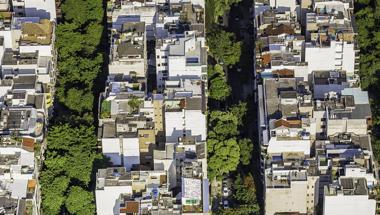
Dr Giulia Torino
Lecturer in Urban Geography
Research interests
- Geography
- Culture
Contact details
Biography
Trained in architecture, urban design, and social theory across the UK, US, Colombia, and Italy, Giulia is an urban scholar working at the intersection of city design and governance, sociology, and geography. Her research combines ethnographic, visual, and critical mixed methods to examine cities as sites of movement, power, inequality, solidarity, and collective world-making.
She is currently Principal Investigator on a British Academy-funded project investigating displacement, labour, and temporary migrant urbanisms across the central Mediterranean, with an empirical focus on Sicily and a theoretical framework connecting Europe's longstanding Southern question (Gramsci) to Black Geographies and critical migration and urban theory.
Over the past decade, her ethnographic work has also centred on everyday politics and the racial political economy of urban governance in Bogotá, asking what it means to think about structural social inequality and spatial injustice in Latin American cities through the conceptual lenses of racial capitalism and coloniality.
Increasingly, her research is turning toward urban futures and prefigurative urbanisms, exploring how digital technologies, grassroots infrastructures, and translocal solidarities can shape imaginaries (and practices) of socioecological justice, care, and cohabitation.
Giulia's research has been supported by the British Academy, the Arts and Humanities Research Council, Peterhouse and King's College (University of Cambridge), the Society for Latin American Studies, and the Kettle’s Yard Arts Fund, among others. Her writing has appeared in Social & Cultural Geography, Dialogues in Human Geography, Identities, the South Atlantic Quarterly, and the Journal of Latin American Studies, as well as in public-facing outlets.
Giulia joined the Department of Geography in 2023, following a Junior Research Fellowship at the University of Cambridge. She was previously affiliated with the Universidad Javeriana in Bogotá and the Department of City Planning in New York City, and has consulted for Amnesty International in New York/London and urban grassroots organisations in Colombia. She speaks English, Spanish, and Italian fluently, French moderately, and is studying Japanese towards level N5, with great curiosity and little grammatical success.
Research
- Everyday urban politics and governance
- Global displacements, borderlands, and migrant urbanism
- Racial capitalism and urbanisation
- Decolonial and Southern urban epistemologies
- Pluriversal urban futures
- Ethnographic and mobile urban research
Teaching
Undergraduate
- 4SSG1014 Geographical Foundations
- 4SSG1016 Geography in Action
- 4SSG1008 Fieldtrip
- 5SSG2063 BA Geography Research Tutorials
- 6SSG3072 Right to the City
Undergraduate/Postgraduate
- 6SSG3076/7SSGN212 Critical Geopolitics
PhD Supervision
Giulia is not currently accepting PhD applications for the 2025/26 academic year.
Further details
Research

Urban Futures research group
Examining urban futures through a conceptual, analytical and methodological lens that questions what cities are and how they work.

Contested Development research group
Exploring environmental, political and social questions in relation to contested and uneven processes of development.
Features
Hidden in plain sight: how racism shapes Latin American cities
Dr Giulia Torino examines how urban planning in Bogotá, Colombia, perpetuates racism under a facade of multiculturalism.

Research

Urban Futures research group
Examining urban futures through a conceptual, analytical and methodological lens that questions what cities are and how they work.

Contested Development research group
Exploring environmental, political and social questions in relation to contested and uneven processes of development.
Features
Hidden in plain sight: how racism shapes Latin American cities
Dr Giulia Torino examines how urban planning in Bogotá, Colombia, perpetuates racism under a facade of multiculturalism.

